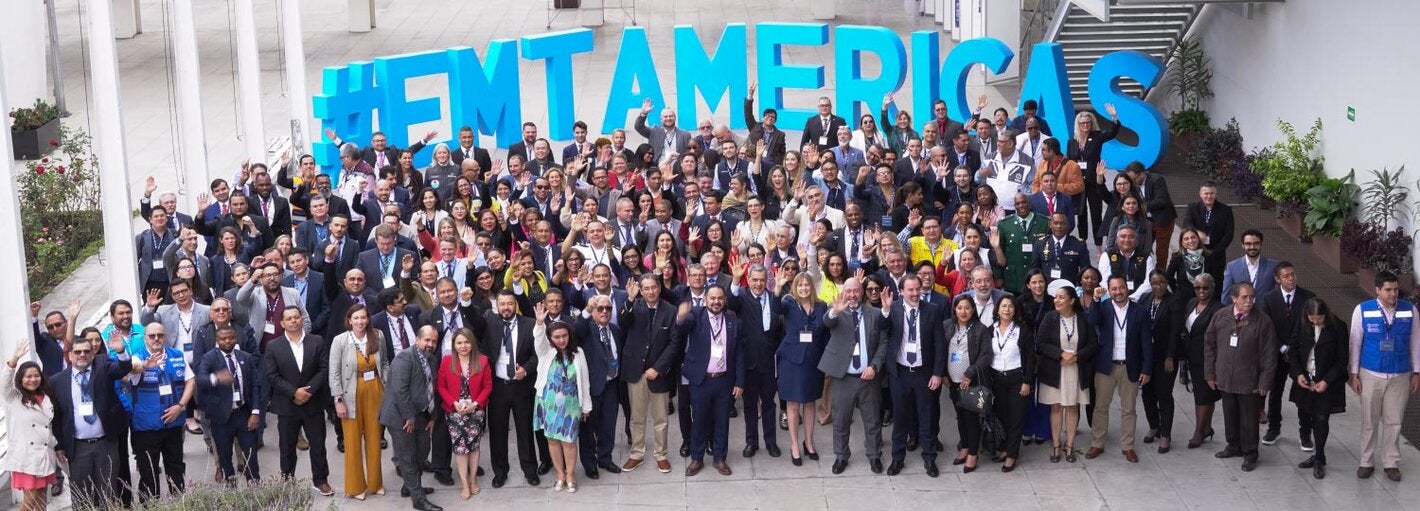
National EMT focal points, emergency medical team leaders, clinical and logistical experts and CICOM coordinators were among the 189 professionals who gathered in Mexico.
Mexico. December 18, 2023. PAHO/WHO – The Emergency Medical Teams of the Americas closed 2023 with the III Regional Meeting, identifying subregional priorities and needs for 2024, and establishing a road map for the EMT-2030 strategy.
189 professionals from 26 countries and 14 non-governmental organizations participated in the meeting, which was held in Mexico last November, and was co-organized by the Secretariat of Health of Mexico and the Pan American Health Organization (PAHO/WHO) and was financially supported by the Spanish Agency for International Development Cooperation (AECID) and the Ford Foundation.
The purpose of the meeting was to establish the regional and country roadmap for the implementation of the EMT-2030 strategy in the Americas, which was developed through a consultative process in which the region participated actively.
During the meeting, 62 experts, through 14 technical panels, reviewed with the participants the main objectives of the EMT2030 strategy:
- Strengthen effective partnerships, leadership and operational governance.
- Provide comprehensive, accessible and quality health services.
- Implement and expand standardization and quality assurance strategies.
- Strengthen coordination, information management, evidence and research systems.
The national delegations and the NGO Advisory Group (NAN) reviewed the needs of the subregions and identified 60 priorities.
One of the aspects that the leaders of the national EMTs highlighted was the impact of the mobile hospital donations made by US SOUTHCOM and the equipment donations made by PAHO/WHO under the American Rescue Plan with funds from the United States Government to develop EMTs in the countries. Through this effort, PAHO/WHO delivered 72 pieces of equipment, including water treatment kits, biomedical waste management, radiology and ultrasound equipment, electromedical and medical equipment kits, temporary vaccination and hospitalization modules, for a total value of 5.8 million donated by USG and GER. Thanks to this support, 17 countries in the region are strengthening their capacity for rapid and coordinated response during health emergencies, both at the national level and among neighboring countries.
In addition, during the event PAHO recognized the 9 regional EMTs that have been classified by WHO as international EMTs, for their commitment to meeting global EMT standards.
The presidency of the regional EMT group was also replaced by Dr. Gabriel García, focal point of Mexico, during 2023 and by Dr. Gerardo Solano, focal point of Costa Rica, during 2024.
The event ended with presentations by each sub-region and the NAN of their roadmaps, as well as words of recognition for regional progress by Alejandro Fuente, regional humanitarian action project manager for Latin America and the Caribbean of AECID, and Flavio Salió, global leader of the WHO EMT initiative.
The WHO Director-General considers the EMT2030 strategy and Emergency Medical Teams (EMTs) as a critical component of global health emergency preparedness and response and for the future development of a rapidly deployable Global Health Emergency Corps.
Meanwhile, advisor Luis de la Fuente, coordinator of PAHO's EMT Regional Secretariat, highlighted the importance of the meeting not only for the establishment of the regional roadmap of the EMT-2030 strategy, but also for the exchange of lessons learned, knowledge and experiences, as well as for the strengthening of collaborative and interoperable responses among the countries to possible future health emergencies and disasters.
Access the EMT Americas dashboard to learn more about the implementation of the EMT initiative in our Region.
Visit the III Regional EMT Meeting photo gallery here











